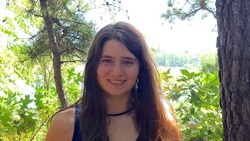Stockton Student Is 1 of 7 in N.J. Working for State Department of Environmental Protection
For Immediate Release
Contact: Maryjane Briant
News and Media Relations Director
Galloway, N.J. 08205
Maryjane.Briant@stockton.edu
(609) 652-4593
www.stockton.edu/media
Galloway, N.J. - Helping to determine how much carbon the wetlands can store, information that will ultimately be useful in combating damage to Earth’s ozone layer, is not your average summer job.
Arianna Efstatos is not your average summer worker. As she prepares to enter her junior year as an Environmental Science major with minors in Mathematics and Biology, the19-year-old earned a very select internship with the state Department of Environmental Protection.
 “Arianna is one of only seven student interns selected to work on six summer-long
projects covering a diverse range of topics from sustainability to the economics
and marketing of energy sources,” wrote John Giordano, assistant commissioner, Air
Quality, Energy and Sustainability, in the N.J. DEP, in announcing Efstatos’ selection.
“Arianna is one of only seven student interns selected to work on six summer-long
projects covering a diverse range of topics from sustainability to the economics
and marketing of energy sources,” wrote John Giordano, assistant commissioner, Air
Quality, Energy and Sustainability, in the N.J. DEP, in announcing Efstatos’ selection.
She is working on a project that focuses on carbon sequestration in the wetlands, reviewing research and using Geographic Information Systems (GIS) mapping to calculate the area of New Jersey’s wetlands and the land’s use.
“Carbon sequestration is the process by which carbon is stored in solid or liquid form on Earth’s surface. When land is disturbed for agriculture or development, carbon is released and does damage to the ozone layer and creates a ‘greenhouse effect’ on the surface by preventing ultraviolet rays from the sun from escaping,” she explained. “It is important for the health of the environment to capture carbon at the surface, in vegetation, soils, or any organic material. Retaining the carbon prevents its release into the atmosphere and negates the effects of greenhouse gases.”
Wetlands comprise nearly a quarter of the state’s total area, and “are one of, if not the most efficient land types when it comes to sequestering carbon,” Efstatos said. “Studies have shown that just one square mile of salt marsh habitat removes about 2,000 tons of carbon dioxide each year. This is the same amount released by a Hummer driving over two MILLION miles.”
The Egg Harbor Township, N.J. resident points out: “All around our coast and bordering lakes and rivers, we see wetlands - a great example is Forsythe Wildlife Refuge not far from Stockton’s campus. So much of it is drained and converted for other uses, but now that we are learning more about their carbon sequestering power, there are more efforts to preserve them.”
The opportunity came about as a result of a career fair she attended at the DEP headquarters in Trenton.
“I believe there were three primary reasons I received the internship offer: my pending BS Environmental Science degree, GPA, and my minors in biology and mathematics,” she said. “They like to see students come in with experience from multiple disciplines, rather than focusing on just one area of study. Their offer made me feel as though the work I put in over the last couple of years was worth it and valuable to environmental organizations.”
When she is not doing research, she is interested in taking impromptu trips, playing the guitar and “hanging out with my friends, my brother, and my new puppy, Duke!”
She also stays involved with Holy Trinity Greek Orthodox Church and volunteers at its annual Greek festival. She joins other church members in making sandwiches for Sister Jean’s Kitchen in Atlantic City, among other service projects.
On campus, Efstatos is active in the Honors Program as well as Alpha Phi Omega, a service-oriented fraternity and has a job in the Office of Research and Sponsored Programs.
“My main focus now is staying on a path that will develop my skills in a way that allows me to improve our existing communities,” she said. “I want to change the world by helping others thrive in their own environments.
She thanked her parents for being such a strong influence in her life and for providing the financial support that has allowed her not only the experience of college and campus life, but also numerous opportunities to travel independently.
Another major influence in her life was her sixth-grade teacher, John Jones, at the Alder Avenue Middle School in Egg Harbor Township. She called him “the first person to truly inspire me to love learning about our environment and sustainability. I honestly believe his passion is what influenced me to pursue this field of study. I still remember visiting and tending to the school’s outdoor garden so many years ago.”
Future goals include going to graduate school and getting a master’s degree, while trying out other internships to see what she enjoys most.
“Stockton was a great option for me coming out of high school,” she said. “The university has given me not only financial support, but great exposure to the areas of study I am most interested in. Because of my experience at Stockton, my interest in continuing my education has gotten stronger; there is so much more to learn.”
For more information about Stockton University’s distinctive students, visit Stockton.edu/distinctive.


